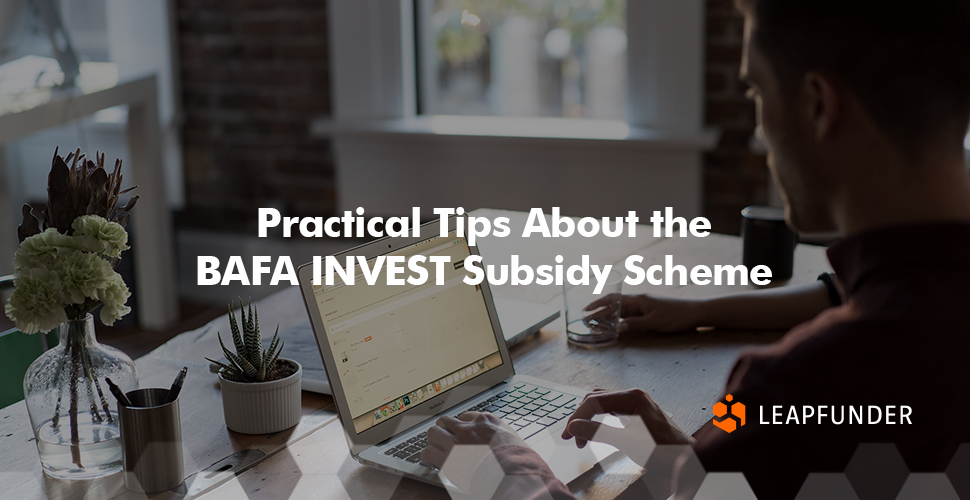In Germany, a startup investment may be eligible for an INVEST grant. The INVEST grant is a state subsidy program for Angel investments run by the Federal Office of Economics and Export Control (BAFA). The system subsidizes private investors, in particular business angels, to provide capital for these companies. It does allow these private investors to use a personal holding, but it is not for professional investment companies.
The INVEST grant is subject to strict limiting conditions. For this reason, it is usually only applicable to some of your investors, not all of them. Because of the conditions, it is also possible that your investors will not be sure that they will get the grant for several years. For a startup, it is usually best to explain to investors that the INVEST grant is not certain, and therefore it should be ‘nice to have’, not a certainty. Find out more about the BAFA INVEST subsidy scheme, the conditions, and the application procedure.
 What are the up-front benefits of this subsidy for investors?
What are the up-front benefits of this subsidy for investors?
If eligible, an investor receives an investment grant amounting to 15 percent of the investment sum if the investment is in the form of a convertible or priced equity. The grant will be given out when the convertible converts into shares, or when the final shares are issued in a priced equity deal. The investor needs to submit an application online and receive a positive decision.
For example: if an investor invests €100,000 in a company and his application for funding is approved, the BAFA will refund €15,000 to his account as a grant when the convertible converts.
There are also limits to the total amount of subsidy that any investor can obtain over time. Per investor the total grant is limited to EUR 100,000, over all investments since 2013.
What are the tax benefits for investors when there is an exit?
The tax benefit is only for investors that are investing as a natural person. In Germany investors that use a personal holding already pay very little tax on the exit, and so there is no additional tax subsidy. Regular startup investors should consider starting a personal holding for tax reasons.
The tax benefit offered to natural persons by INVEST is as follows: when the investor sells his shares as part of a company sale (exit) then he normally has to pay tax on the profits. An investor can apply for a refund of part of this tax. You will get a refund of 25 percent of the profit that you made, which should roughly be the same as the amount of tax that you would normally have to pay. However, there is a maximum: you will only get a tax refund up to a maximum amount equal to the grant you got on your original investment. So, if you invested €100K and got an €15K grant then you basically get a tax refund of at most another €15K when you exit. Beyond that, the regular tax applies.
So once again: regular startup investors should consider using a personal holding, which will often give similar tax benefits but those are unlimited.
What are the conditions for the grant?
The INVEST scheme has improved a lot over the years. However, it still contains a lot of conditions that are hard to meet. For this reason, it is rare for all investors in a startup to be eligible. Usually, only a few investors are eligible, and usually, you are not sure about this until several years after your investment. We, therefore, see the INVEST scheme as ‘nice to have’ for investors. It shouldn’t be a condition.
Here are the conditions that often block the INVEST scheme:
- In general only the first investment in a company is eligible. That is a substantial limitation since it is common for informal investors to keep investing in later funding rounds to support their portfolio. It is normal for the first investment to be relatively small: by making follow-on investment in their most successful companies an investor can make sure most of their capital goes to their strongest companies.
- The minimum investment amount must be €10,000. Online investors will sometime choose to invest less than that, especially in the very first round.
- There is a maximum total subsidy that any investor can receive of E100,000. Since the scheme has been running for over a decade some investors will be starting to reach that ceiling
- The investment cannot be pooled through a pooling SPV such as a K.G. or a G.B.R. Of course, it is standard practice to pool all small investors via a pooling vehicle. Typically, investors below €100K are pooled, while only bigger investors may hold shares directly. For this reason, the INVEST scheme is normally only for those larger Angel investors
- A convertible investment needs to be converted within 24 months. It is rare for an early-stage convertible investment to convert that quickly. And so, the investors will only rarely receive the INVEST grant in the end.
- The investor must hold their shares for at least three years. If they sell them before the end of the minimum holding period, they run the risk of having to repay the investment grant.
Theoretically, a startup could make sure all investors are eligible by allowing all investors to go onto the cap table as shareholders directly, without using a convertible and without using an SPV. However, a startup that uses this funding strategy will have a reduced chance of success. This funding strategy will do real harm to the cap table and future investors would be less likely to want to fund it. No Angel investor should want that.
What is the application procedure?
First, the startup must submit an application for the INVEST grant. An online application is sufficient. The applications are submitted before the start of a financing round.
The investor then applies for approval of the investment grant. The application can be made online on the BAFA website . The application needs to be made before the investment is made.
When the investment subsidy is granted then investor can complete the investment, and submit evidence of the investment to BAFA. Communication and documents have to be available in German.
The scheme is sometimes adjusted, so please check for latest information with BAFA itself. You will find all details on the INVEST grant on the BAFA website.
Join our network of startups & investors!


